Here are 3 top tips to prevent it, and 1 hack to use when it happens.
- Get enough sleep!
This is probably the most significant factor in your training. Not only does sleep aid in recovery from any kind of workout, but more importantly it allows the brain to reset, process, and recharge. - Hydrate.
It is common to see water bottles filling an area in a Dojo or gym. It is interesting that people find it necessary to drink some water to feel better. This is more a psychological, rather than physiological, association. The best time to hydrate yourself is before training. Pre-hydration prevents de-hydration. Dehydration has been linked to increases in mental fatigue, loss of incentive (your brain starts to shut down to preserve water), and increased muscle cramping. It is true that you are, hopefully, sweating it out in the Dojo; but if you are feeling dehydrated, a sip of water during class will not do much. I'll write something more substantial on this if there is interest. Aim to drink at least 300ml of water about an hour before training, more if you know you are going to sweat a lot during a particular session. - Nutrition.
Make sure you have energy to call on, not energy in reserve. The body/brain has a number of different systems it uses to extract energy and apply it in different situations. Without getting all #biochem on you, you need to ensure you have energetically prepared for a session. Usually a piece of fruit (bananas are a great source of everything you need) along with your water about an hour before training will suffice. Of course if you are like Jasmine (my daughter) it will be an apple, a pear, a Carmen's bar, and likely gunning for a piece of chocolate!
Your body will make use of the energy soon enough, and using glucose (natural sugar - also comes from carbohydrates when broken down) is a great way to give the body what it needs. Like most things, moderation is the key. Be sure to have something post-training as well to ensure you get a proper sleep too. - A.B.P.H.
No, this is not another acronym for some special biological system in your body. A.B.P.H. is a completely non-scientific term we coined in collaboration with a Year 6 Life Skills group I lead in 2009. It stands for Anti-Boredom Psychology Hack. It is basically using mental strategies to re-frame your perspective. If you are experiencing #brainfog , then clearly your mind has wandered from the focus. It is likely that you don't place personal importance on whatever is being demonstrated or explained to you. This is a common problem in education, and the Dojo is no different. Re-framing can be a fun process. It can involve an inner dialogue where you look at what is being explained/demonstrated and apply it in a different way, mentally. I use similar strategies when teaching children in schools about how to actually use mindfulness to avoid boredom and distraction.
"I wonder if I could use this technique on my brother/sister?"
"I never noticed Sensei's belt had that feature."
"When we start practicing, what is the best way I can do this technique?"
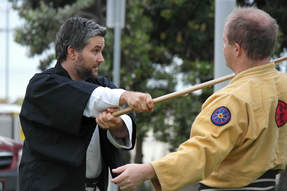 Focus is often a challenge to maintain.
Focus is often a challenge to maintain. This whole process can take merely seconds, but will go a long way to helping you stay on track, and getting back into the right frame of mind.
What are some of your funnier brainfog moments? Do you have a personal A.B.P.H.? Please share.
Darren Ball
Shihan, Yamagawa Budo.

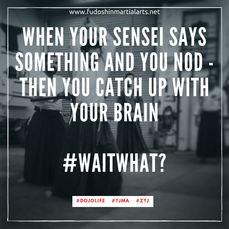
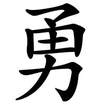
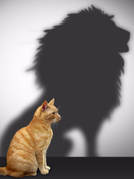
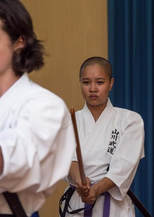
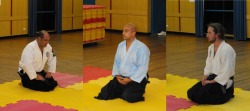
 RSS Feed
RSS Feed
